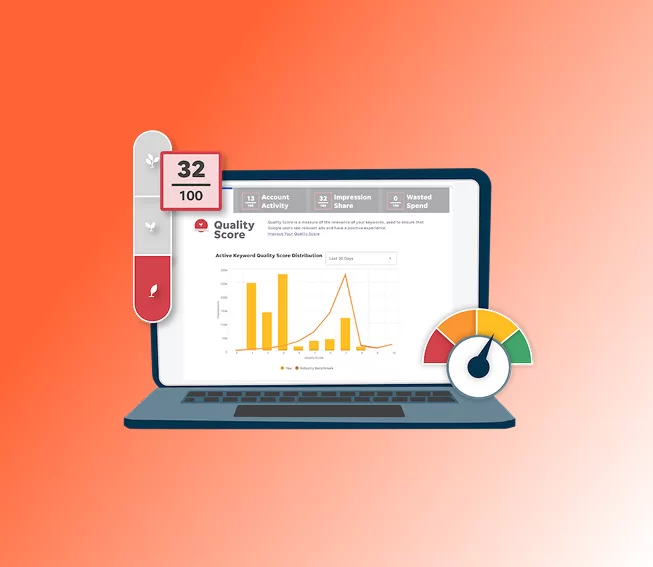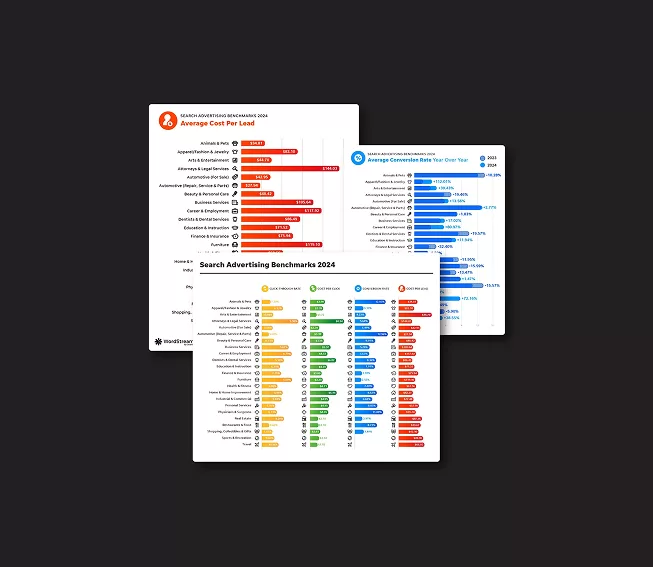Without customers, none of us would be in business. So to stay in business, we need to listen to the feedback of our customers. The thing is that customers don’t always come running to us to share their thoughts, which means that we have to actively seek feedback.

But what questions are worth asking? Which ones will get you the most valuable insights with which to improve your business? And how do you ask for customer feedback in the first place? We’re sharing the top customer feedback questions you need to know broken down by:
- Questions related to customer profiles
- Customer feedback questions about your company and offerings
- Questions about your marketing and messaging
- Customer feedback questions about your competitors
Plus, we’re sharing how to ask for customer feedback and how to use the answers to benefit your business big time!
Customer feedback questions related to customer profiles
Smart marketers understand the value of detailed customer profiles, also known as buyer personas.

At the very least, you’ll want to gather demographic information about your customer base including the most common shared age ranges, locations, education levels, professions, and so on. This is where marketers stop, not wanting to seem like they’re prying or pushing for personal info.
However, it’s also important to ask questions such as:
1. “What are your biggest challenges?”
Of course, you’ll be especially interested in the challenges that your company provides solutions for. However, other pain points your target customers experience can inform and enhance the way you engage with them, making your marketing more effective.
2. “What are your main goals?”
Your customer’s responses reveal what they really want and, more importantly, what they care about most. This keeps you from guessing at what you think they want or prioritizing selling points that, while beneficial, are not the main things your customers are after.
Plus, you can also gain insight into the differences between their long and short-term goals, which can help you plan for each stage of the buyer’s journey.
3. “Where do you go for information on [your industry, product, or service] and why?”
Answers to this question reveal your customer’s mindset and who they currently trust as it relates to your industry. This can teach you how to earn and maintain their trust.
4. “How do you like to make purchases?”
Do your customers prefer to do a demo or product tour before they buy? Do they prefer to meet in person or virtually for a consultation first? Or do they like to have the time and space to do their own research and purchase online when ready?

Whatever the answer, spotting patterns in customer behavior can help you choose the most persuasive calls-to-action (and help other teams within your company to nail the user interface and user experience).
5. “What are your hobbies and interests? How or where do you spend your free time?”
While this might seem off-topic and not necessarily relevant to what your company does, this information can be surprisingly useful.
For example, let’s say that many in your audience share a certain passion. You could use that as inspiration for examples and analogies in your content, case studies, or the language you use in your copy.
Customer feedback questions about your company and offerings
Next up are some important customer feedback questions to ask regarding your company and what it offers.
6. “What solutions (products, services, or specific features) do you associate us with?”
One, this can give you an idea of what products or solutions are most important to your customers.
Two, it can reveal gaps in their knowledge of what your company offers. For instance, you could find that you’ve been unknowingly promoting certain offers more than others, although your target audience could benefit from your less popular products, services, or features as well.
7. “What prompted you to search for or switch to our product or service?”
The better you understand what business or life events that start people on the road to becoming your customers, the more potential customers you can attract and convert. How?
By showing that you understand those triggers, and making your company visible when and where ideal customers are entering the buyer’s journey.
8. “Before you became a customer, what were your expectations or hopes for our product or service?”
Similar to the question about goals, this one also reveals what people want from what you offer. The better you understand their goals, the better you can market to them.
Not to mention that you can pass the information along to other teams to improve your product or enhance the level of service you provide.
9. “Has our product or service helped you achieve your main goals?”
There’s no point in asking about initial expectations without also inquiring about the post-purchase experience. Is what you offer really getting results for people? Does it meet or exceed people’s expectations? You need to know.

10. “What don’t you like about our product or service? If you could change one thing, what would it be?”
It feels great to get outstanding customer feedback and to hear success stories. But customer experience is rarely all peaches and cream. So don’t be afraid to ask for constructive criticism. Only when you know what customers dislike about your offerings can you consciously, strategically give them something better.
And don’t just ask what they don’t like; narrow their options by requesting a single thing they would change. That way, they’re more likely to share their biggest dislike, which will help you to prioritize improvements.
11. “How often do you use our product or service?”
Responses to this question can say a lot about the severity of your customer’s pain points, the importance of their goals, and the quality of what you offer.
For example, if you offer a product that’s meant to be used daily to solve a major challenge, but your customer only uses it a few times per month, you’ll want to get to the bottom of why. Is the product not meeting their needs? Are they lacking the motivation that you can help to spark with your marketing?
12. “How would you feel if you couldn’t use our product or service anymore?”
Understanding the emotional connection people have to your brand is crucial. Unless your company has a monopoly on the industry and customers have no choice but to pick you, they have other suitable options. So, you can’t appeal solely to logic in your marketing; your competitors will be doing the same.
To get on top and stay on top, you also have to forge deep customer relationships (AKA emotional connections) with your target market so that they have extra motivation to choose and stick with you.
Related: 120 of the Best Words & Phrases for Marketing with Emotion
13. “What would make you stop doing business with us?”
You’d probably agree that it’s better to know the depth of your customer’s loyalty before they abruptly part ways with you. That way, you can do a deep dive into why they are or aren’t bonafide brand advocates that plan to keep doing business with you and take action to keep them as customers.
Customer feedback questions about your marketing messaging
As an extension of questions about your company, you can and should ask for feedback on your marketing messaging specifically. Your interviews or customer feedback survey questions should dig into how people understand and feel about it.

14. “What content formats and channels do you prefer?”
Customers have the power of choice. They can choose you, they can choose competitors, or they can choose nothing at all; the choice is theirs until you as marketers meet their requirements for engagement.
If you don’t produce content in formats or on channels they like, they can and probably will choose not to engage. So, instead of going with personal preference or what’s trendy, ask about and be respectful of the preferences of your audience.
15. “What topics would you like to see us create content around?”
Just like formats and channels matter, topics matter. If you’re talking about things that aren’t relevant to your audience—either because they’re too basic, too advanced, or just not interesting—you’ll struggle to get consistent results from your marketing.
Find out what topics are on your customers’ minds and focus on those; they will appreciate you listening to their feedback.
PS: Get more customer appreciation ideas here!
16. “How would you describe our [unique value proposition, product, or service]?”
This question is pure gold because can singlehandedly tell you if your messaging is clear and if the way you present it matches with how your customers talk about your brand and company.
If the description your customers give is not aligned with the message you’re promoting, you know you need to go back to the drawing board. If it’s mostly aligned, you either need to clarify the message or sync your brand language with that of your audience. And, if your customers’ responses are spot on, you know to keep doing what you’re doing.
17. “If our brand or company were a person, how would you describe it?”
Similar to the last question, this can help you see your brand through customers’ eyes and make sure that the vibe people are getting is on par with the impression you want to make. Even better, customer responses can lead you right to the root of any misalignment so that you can fix it.
Related: Get tips to build a brand personality here.

18. “Is there anything you dislike about the way we present our products or services?”
True, not all customers will answer this question honestly; some may dodge it to be nice or sugarcoat their criticisms. But there are customers who will be brutally honest with you, and their feedback is invaluable.
Don’t shy away from asking outright what people don’t like about your messaging. Often, they’ll point you in the right direction quicker than you could figure it out on your own.
Customer feedback questions about your competitors
Last up, it’s smart to ask for your customers’ thoughts on both direct and indirect competitors.

19. “What solutions did you try before ours and what was your experience (from the time you started searching to the point you decided to switch to us)?”
It’s important to be aware of who your top competitors are, whether they’re other companies that offer similar products and services or DIY alternatives to what you offer.
And it’s just as important to know the strengths and weaknesses of those competitors so that you can take every opportunity to stand out as different or better.
20. “What frustrates you the most about [your industry, product category, or service type]?”
This question goes along well with our earlier one about customers’ biggest challenges. Understanding their frustrations can help your company avoid pitfalls and clarify the most important aspects of your solution to promote front and center.
21. “What feature, product or service could [major competitor] offer that would make you consider switching?”
Responses to this question can help you identify what’s most important to your audience. And it can also give you ideas for staying ahead of the curve when it comes to new and improved offers that could help you gain and retain customers.
How to ask for customer feedback: Best practices
You might have noticed that all 21 of the asks above are open-ended. This is no coincidence. What’s the importance of using open-ended questions for customer feedback collection? Think about it.
If you were to primarily ask yes or no questions, you’d end up with oversimplified answers and little to no context on why your customers feel the way they do. Not only could that make it difficult to improve your marketing and business but being in the dark about the nuances of customer responses could even make your marketing less effective.
And what about leading questions such as “how satisfied are you with our product” or “how well did our services meet your needs?” They subtly assume that customers feel a certain way, which can prompt them to answer your questions differently than they otherwise would.
Ultimately, your goal is to get as much pure, honest feedback as you can. So whether you ask the questions above or others that are relevant for your business, make sure they’re open-ended.
How to use customer feedback to the fullest
Now that we’ve gone over what to ask and how to ask it, here’s an overview of a very effective process for using the feedback you receive from your customers.
1. Build a community around it
Customers want to feel and be heard by the companies they engage with. And it’s often much harder to make them feel that way when there’s no transparent, collective conversation about what’s working for them and what’s not. Not to mention that it can be tough to keep gather feedback continuously when the conversation is limited to just you and them. And when they can’t see if or how their comments are being considered or implemented.
This is where a brand community comes in. It reduces friction when customers see that others share their experiences and validate their feelings. But it can also encourage them to continue sharing their thoughts with you, which earns you additional customer insights manual feedback collection needed on your end.
ClickUp’s Canny board is a sterling example of this. It’s home to thousands of discussions between users and the ClickUp team about the product.

The community aspect sparks a chain reaction of additional engagement and the team’s involvement makes users feel heard. Of course, how you collect customer comments may be different but you can enjoy the same benefits if you build a community around sharing feedback
2. Identify the most common comments
Realistically, not every bit of feedback will be something you can or should implement. So the question is: What common threads do you notice between the lines of customer comments? Whatever they are, those are the concerns, desires, and ideas that your marketing team and entire organization should take the most seriously.
In ClickUp’s case, its voting system makes this easy for the team. For the most part, the most upvoted ideas are the top priorities on the product roadmap.

While you can find common themes manually or devise an internal system to spot them, it might also be worth looking into a way to let customers point you to the most important feedback.
3. Prioritize action on the most common customer feedback
Once top priorities are identified, it’s important to follow through and implement valuable changes and improvements. And not just within the marketing department.
As you can see from our list of questions, much of the information shared by your customers can also benefit other teams within your company so be sure to pass it on. It will keep everyone on the same page internally, and it will translate into a far better customer experience and higher customer acquisition and retention rates!
Ask for customer feedback to improve your business today
Customer feedback can help you improve your business and better serve your customers. Ask these 21 customer feedback questions to get started collecting valuable data:
- What are your main goals?
- What are your biggest challenges?
- Where do you go for information on [your industry, product, or service] and why?
- How do you like to make purchases?
- What are your hobbies and interests? How or where do you spend your free time?
- What solutions (products, services, or specific features) do you associate us with?
- What prompted you to search for or switch to our product or service?
- Before you became a customer, what were your expectations or hopes for our product or service?
- Has our product or service helped you achieve your main goals?
- What don’t you like about our product or service? If you could change one thing, what would it be?
- How often do you use our product or service?
- How would you feel if you couldn’t use our product or service anymore?
- What would make you stop doing business with us?
- What content formats and channels do you prefer?
- What topics would you like to see us create content around?
- How would you describe our [unique value proposition, product, or service]?
- If our brand or company were a person, how would you describe it?
- Is there anything you dislike about the way we present our products or services?
- What solutions did you try before ours and what was your experience (from the time you started searching to the point you decided to switch to us)?
- What frustrates you the most about [your industry, product category, or service type]?
- What feature, product or service could [major competitor] offer that would make you consider switching?






